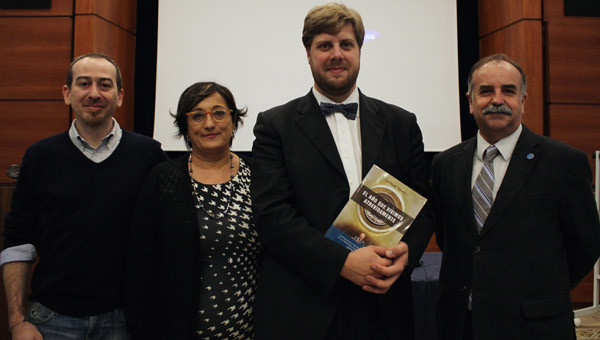Guarini Institute for Public Affairs Hosts Screening of "The Troublemaker: Behind the Scenes of the United Nations"
On Wednesday, November 4th, 2015, the Guarini Institute for Public Affairs and the Budapest Centre for the International Prevention of Genocide and Mass Atrocities jointly hosted a film screening of “The Troublemaker: Behind the Scenes of the United Nations”. A panel discussion followed the screening with Roberto Salinas (Director of the documentary), Gioia Avvantaggiato (Executive Producer of the documentary), Enzo Maria Le Fevre Cervini (Director of Research and Cooperation of the Budapest Centre for the International Prevention of Genocide and Mass Atrocities), and Enrique Yeves (Director of the Office for Corporate Communications to the FAO).
The documentary recalls a year in the life of the United Nations (UN) General Assembly through the eyes of Father Miguel D’Escoto, who was elected President of the General Assembly in September 2008. As President, his directness and plain speaking clashed with the protocols and polished diplomatic language of this venerable yet moribund 66-year-old institution.
In his welcoming address, Prof. Argentieri, director of the Guarini Institute for Public Affairs, emphasized the connection existing between JCU and the UN. Several JCU graduates have interned and worked for the Rome-based UN agencies FAO, IFAD and WFP; this despite the general awareness of the shortcomings shown by the UN over the past quarter century.
While introducing the film, Director of Research and Development of the Budapest Centre Enzo Maria Le Fevre Cervini highlighted how Father D’Escoto was a powerful yet humane figure as the President of the General Assemby. Le Fevre encouraged the participants to be “a little bit of D’Escoto themselves”, fostering constructive ideals that are capable of reinventing the status quo.
When asked about “The Troublemaker”, director Roberto Salinas said it was necessary to show the human dimension of Father D’Escoto in order to understand its impact at the UN. The director stressed how throughout the movie, Father D’Escoto tries reaching his colleagues and antagonists by holding their arms, hugging them, and generally making strong physical and eye contact.
Director of the Office for Corporate Communications to the FAO Enrique Yepes, who had worked closely with D’Escoto in his previous assignment and appears often in the film, said the documentary has shown that some things in the UN have not changed, which is why people should be skeptical of such organizations nowadays. However, reform of the UN is possible and achievable if everyone follows the path of “The Troublemaker” and acts in the interests of humanity. Furthermore, Yepes highlighted the importance of revealing the contradictions of such organizations, as Father D’Escoto did, to understand their shortcomings and to call for the reinvention of such systems in the future.






